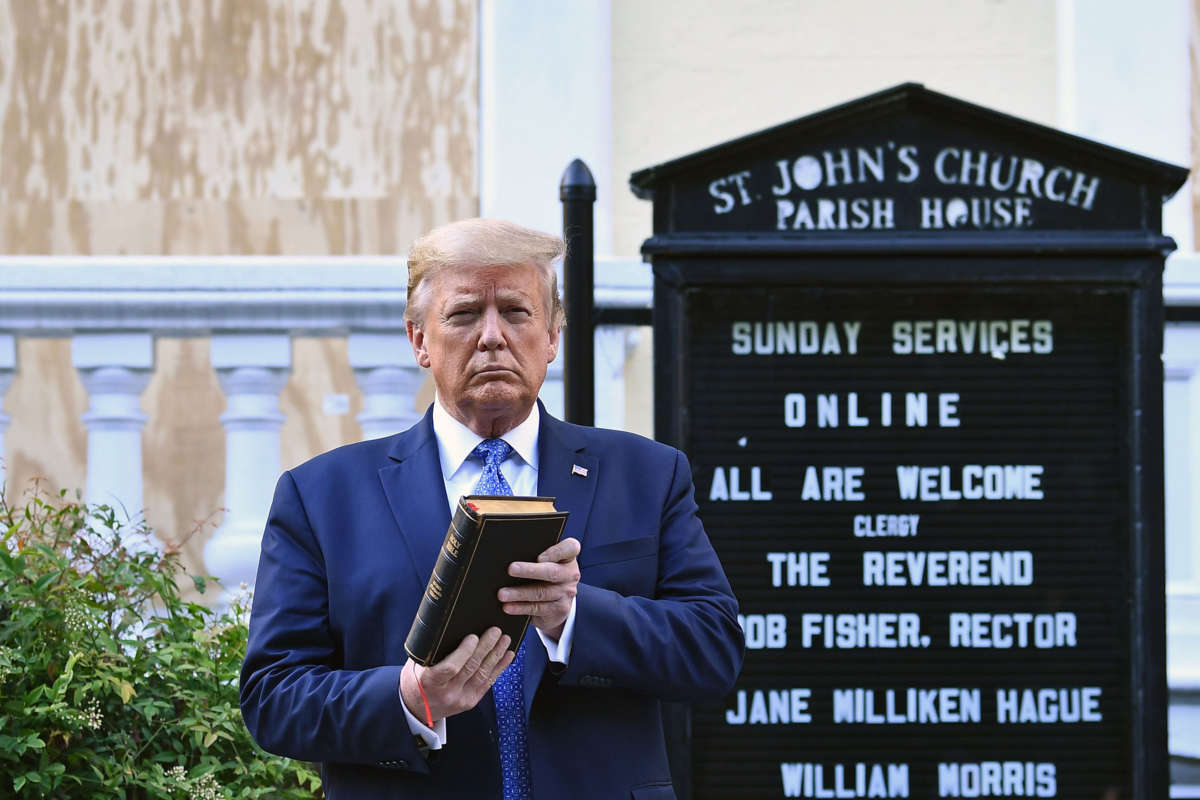A Trump-appointed inspector general at the Department of Homeland Security (DHS) blocked suggested investigations into the Secret Service in 2020, proposed by career staffers, that would have examined the agency’s COVID-19 response and missteps, as well as the violent mistreatment of protesters in Lafayette Square last summer, in order to grant the former president an unimpeded photo op.
Records and statements obtained by the Project On Government Oversight (POGO), a nonprofit government watchdog organization, showcased how Joseph Cuffari, the department’s inspector general, refused to tackle these issues even though he was urged to do so by staff within DHS.
According to the organization’s report, details of which were shared with The Washington Post, Cuffari, who was nominated to his role by former President Donald Trump, often “pulled his punches” on such suggested inquiries. Private complaints from career staffers suggested Cuffari often refused to dig deep on issues that would have brought embarrassment to the former president.
“Cuffari pulled his punches on exactly the type of sensitive reviews his office was created to perform. It doesn’t look like he’s an independent watchdog,” Nick Schwellenbach, senior investigator at POGO, said.
On the Secret Service’s handling of coronavirus, and preventing its spread among officials in the agency, it was clear there were problems. More than 130 officers were infected with the virus or quarantined out of possible exposure, reporting from last fall revealed, although the full extent on how many in the agency were affected by the virus is unknown.
But when an inquiry was started to find out what protocols were being followed (or ignored), Cuffari first limited, then eventually ended the investigation.
Cuffari also refused to let an inquiry into actions at Lafayette Square to be opened. In June of last year, days after George Floyd was killed by former police officer Derek Chauvin, uprisings happened across several parts of the country, including at the park just outside the White House.
Federal forces used a number of chemical agents, flash-bang grenades and rubber bullets to disperse the crowd. After protesters were removed from the area, the reason why such violent tactics were used became apparent: Trump had wanted a photo op with himself holding up a bible in front of a nearby church.
A spokesperson for Cuffari, Erica Paulson, defended the decision not to pursue these two inquiries, which were pushed as being important by several officials within DHS, by suggesting the department had budget constraints.
“Our office does not have the resources to approve every oversight proposal…. In both of these cases, we determined that resources would have a higher impact elsewhere,” Paulson said.
Yet, an inquiry into these two issues, particularly the Lafayette Square incident, could have provided valuable insights on the Trump administration’s use of the Secret Service, and whether the White House or the agency behaved improperly.
“As a result of Inspector General Joseph Cuffari’s decision not to probe the chaotic Lafayette Square episode, a variety of unanswered questions remain surrounding the Secret Service’s adherence to its own use-of-force and related policies,” the report from POGO stated.
“While not the aim of the probe, an investigation could have shed light on a central point that remains in dispute: Trump administration officials have contended that clearing protestors just coincidentally happened right before the photo op,” the report added. “Many critics find that implausible.”
We’re not backing down in the face of Trump’s threats.
As Donald Trump is inaugurated a second time, independent media organizations are faced with urgent mandates: Tell the truth more loudly than ever before. Do that work even as our standard modes of distribution (such as social media platforms) are being manipulated and curtailed by forces of fascist repression and ruthless capitalism. Do that work even as journalism and journalists face targeted attacks, including from the government itself. And do that work in community, never forgetting that we’re not shouting into a faceless void – we’re reaching out to real people amid a life-threatening political climate.
Our task is formidable, and it requires us to ground ourselves in our principles, remind ourselves of our utility, dig in and commit.
As a dizzying number of corporate news organizations – either through need or greed – rush to implement new ways to further monetize their content, and others acquiesce to Trump’s wishes, now is a time for movement media-makers to double down on community-first models.
At Truthout, we are reaffirming our commitments on this front: We won’t run ads or have a paywall because we believe that everyone should have access to information, and that access should exist without barriers and free of distractions from craven corporate interests. We recognize the implications for democracy when information-seekers click a link only to find the article trapped behind a paywall or buried on a page with dozens of invasive ads. The laws of capitalism dictate an unending increase in monetization, and much of the media simply follows those laws. Truthout and many of our peers are dedicating ourselves to following other paths – a commitment which feels vital in a moment when corporations are evermore overtly embedded in government.
Over 80 percent of Truthout‘s funding comes from small individual donations from our community of readers, and the remaining 20 percent comes from a handful of social justice-oriented foundations. Over a third of our total budget is supported by recurring monthly donors, many of whom give because they want to help us keep Truthout barrier-free for everyone.
You can help by giving today. Whether you can make a small monthly donation or a larger gift, Truthout only works with your support.
